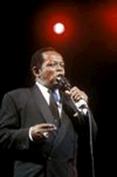
LOU RAWLS
Lou Rawls had a majestic career spanning over five decades, along the way releasing an astonishing sixty plus albums, gathering three Grammy wins, thirteen Grammy nominations, one platinum album, five gold albums and a gold single, awning many styles from gospel to blues to jazz to soul to pop. His voice had been described as Sweet as Sugar - Soft as Velvet - Strong as Steel and Smooth as Butter.
Born Louis Allen Rawls in Chicago on the 1st December 1935, his early musical experience, like so many, was the church. Raised by his grandmother he began singing gospel at the age of seven in the choir of his Baptist church. As a teenager along with high school classmate Sam Cooke they joined the Gospel group Teenage Kings Of Harmony.
Rawls’ first known recording was with the Holy Wonders on Premium Records in June 1950 with 'I Wont Be Long'. During the fifties he recorded one offs with various gospel outfits, The Chosen Gospel Singers, The Pilgrim Travelers, The Travellers.
Like Sam Cooke, Rawls had served as a member of the Pilgrim Travelers gospel group, and in fact later sang back up vocals on Cooke's million seller 'Bring It On Home To Me'. During a tour of the Southern States with Cooke and the Travelers he was seriously injured in a car accident which nearly ended Rawls’ career and life, putting him in a coma for almost six days. Cooke was slightly injured, but it took Rawls a year to fully recover.
Rawls makes his first appearance as a solo artist on Shar-Dee Records in 1960 with 'Love Love Love', with one further release 'Walkin' (For Miles), before moving to Candix Records for a couple of forty fives.
He settled in Los Angeles singing blues and jazz in small clubs. In the early sixties he attracted the attention of Nick Venet, a producer at Capitol, who invited Rawls to make an audition tape. He did and Rawls was signed to Capitol. Teamed with Les McCann results in his 1962 debut album I'D RATHER DRINK MUDDY WATER, the first of more than twenty albums on that label over the next ten years.
It was 'Love Is A Hurtin' Thing' in 1966 which shot Rawls to the top, scooping up two Grammy nominations. From this point Rawls’ popularity took him to new peaks creating his very own distinctive sound with R&B hit after hit, including the 'Dead End Street' gem. Live performances were savoured, breaking attendance records wherever he played, captured brilliantly on the 1966 album LOU RAWLS LIVE.
In 1971 he switched to MGM Records but somehow lacked the magic of his earlier recordings, but this period did include the splendid 'A Natural Man'.
During the disco boom Rawls’ career temporized, until in late 1975 Rawls moved over to the Philadelphia International label, where under the guise of legendary producers and songwriters Kenny Gamble and Leon Huff pitched Rawls to the smoother side of the Philly Soul sound, which results in 1975 with Rawls’ biggest hit, the immortal 'You'll Never Find (Another Love Like Mine)'. Other hits quickly followed, particularly 'See You When I Git There' and 'Let Me Be Good To You' in 1979.
Rawls was a participant in the Philadelphia International All Stars 1977 charity single 'Lets Clean Up The Ghetto' along with Billy Paul, Teddy Pendergrass, The O'Jays, Archie Bell and Dee Dee Sharp. He went on to record for several other labels, including Blue Note, which all sold well to his now captured fan base.
In the eighties he branched into acting, appearing in films and musicals. He voiced animated cartoon characters including the feline Garfield the Cat, Harvey the Mailman, Hey Arnold and The Rugrats film.
In 1999 Rawls appeared on Broadway for a stint in SMOKEY JOE'S CAFE. His last album released in 2003 was 'RAWLS SINGS SINATRA. He died on the 6/01/06 after suffering from, initially lung then later brain cancer.